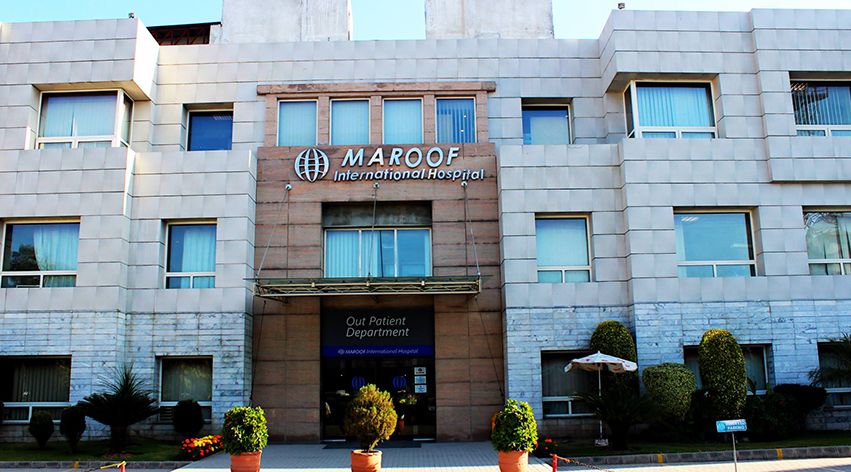IHRA Imposes Rs 400,000 Penalty on Maroof Intl. Hospital

Islamabad: In a significant ruling, the Islamabad Healthcare Regulatory Authority (IHRA) has held Maroof International Hospital accountable for administrative malpractice in the case of Abdul Rehman, who died following a delay in medical intervention.
The penalty of Rs. 400,000 is imposed under Section 29 of the Islamabad Healthcare Regulation Authority Act, 2018, highlighting the hospital’s failure to adhere to its internal policies on informed consent, refusal of treatment, and discharge documentation.
The case came to light after a complaint filed by Abdul Rehman’s brother, Jibran Ullah, was brought to the National Assembly’s Standing Committee on National Health Services, Regulations and Coordination (NHSR&C).
On July 27, 2024, Abdul Rehman, experiencing severe stomach pain, sought emergency treatment at Maroof International Hospital. Following a CT scan, doctors identified the need for immediate surgery. However, the hospital administration reportedly demanded immediate payment, causing significant distress to the family. Despite promising to arrange the necessary funds, the family alleges that the hospital insisted on immediate payment, leaving them with no other option but to transfer Abdul Rehman to another facility in Peshawar.
Tragically, upon reaching Peshawar, doctors discovered severe complications, including perforated arteries and widespread infection. Despite receiving treatment, Abdul Rehman succumbed to his condition on July 30, 2024.
Maroof International Hospital vehemently denied the allegations, claiming that they provided immediate care and stabilized the patient before he left against medical advice. The hospital maintained that they did not refuse treatment and that the family’s decision to transfer the patient to another facility was made against their medical recommendation.
To investigate the matter, the IHRA conducted a thorough inquiry, examining medical records, witness testimonies, and hospital policies. The inquiry revealed several critical procedural lapses within Maroof International Hospital. The hospital failed to properly document informed consent and the patient’s departure against medical advice, despite having specific internal policies in place for such situations. This lack of documentation hindered a clear understanding of the circumstances surrounding the patient’s departure.
Furthermore, the hospital’s internal guidelines regarding “Policy for Informed Consent/Refusal of Treatment” were not strictly adhered to. Key omissions included the absence of documentation of the potential consequences of leaving without treatment in the patient’s medical record, the lack of a signed informed consent form or “Leave Against Medical Advice” form by the patient or his attendants, the failure to obtain a signed physician review on the refusal of treatment/investigation form and to forward it to the concerned Head of Department within the stipulated timeframe, and the absence of a discharge summary for the patient.
The inquiry also highlighted potential communication gaps between the hospital staff and the patient’s family. The family’s claims of being pressured to leave due to financial constraints were not adequately addressed or investigated.
Based on these findings, the IHRA concluded that while the medical treatment provided to Abdul Rehman was not negligent, the hospital’s administrative procedures were severely lacking. The failure to adhere to internal policies and ensure proper documentation contributed to the confusion surrounding the patient’s departure and potentially exacerbated the delay in receiving appropriate treatment.
As a result of these findings, the IHRA imposed a penalty of Rupees Four Hundred Thousand (Rs. 400,000/-) on Maroof International Hospital under Section 29 of the Islamabad Healthcare Regulations Act, 2018. This penalty serves as a strong message to healthcare providers about the importance of adhering to established protocols and ensuring patient safety.
The IHRA order also directed Maroof International Hospital to implement several corrective measures. The hospital was instructed to strengthen its administrative procedures to prevent similar lapses in the future, ensure strict adherence to internal policies, proper documentation of patient care, and clear communication with patients and their families. The hospital was also advised to conduct regular internal audits to identify and address any potential shortcomings in its patient care processes and to provide comprehensive training to its staff on effective communication, patient-centered care, and the importance of following established protocols.
This case serves as a stark reminder of the critical role that clear communication, proper documentation, and adherence to established protocols play in ensuring patient safety and quality healthcare. It underscores the importance of hospitals prioritizing patient well-being and upholding the highest standards of care.




